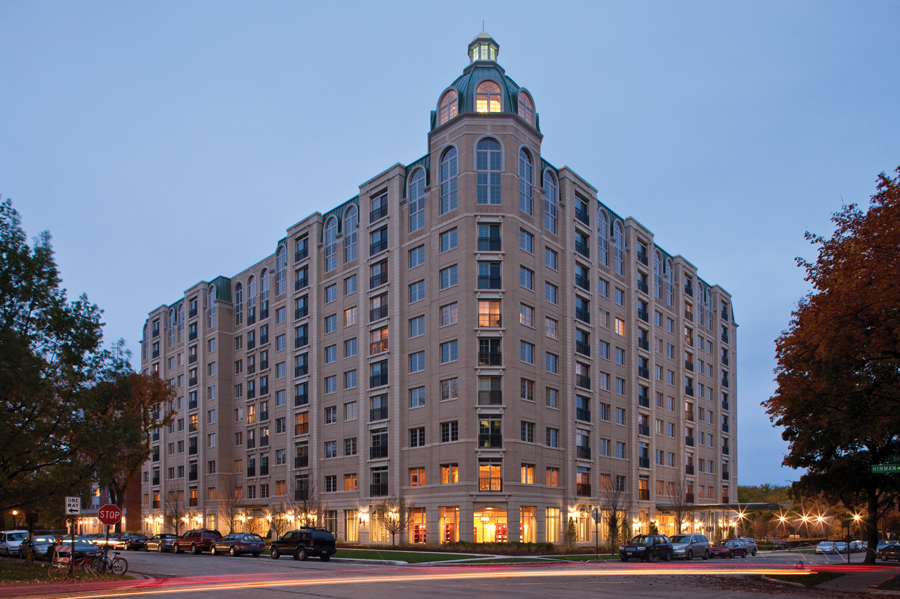Mather Institute study finds link between resident personality and health
The Mather in Evanston. The Mather was one of the participating Life Plan Communities in the Age Well study.
February 5, 2020
For Life Plan Community residents, personality traits like extroversion are associated with engagement in healthy behaviors such as exercise, researchers at the Mather Institute found.
Life Plan Communities such as Evanston’s The Mather provide amenities, programming, health services and other features to support aging residents. The Year 2 phase of the Age Well study, a collaboration between the Mather Institute, Northwestern University and other research organizations, continued a five-year analysis that tracks the same variables to examine the effect of transitioning to a Life Plan Community on residents’ health and wellness.
The study collected survey data from over 5,700 residents who recently entered 122 Life Plan communities across the country.
Cate O’Brien, the assistant vice president and director of the Mather Institute, said Year 2 identified how factors like personality, personal resources, communal factors and organizational factors correlated with healthy behaviors and health outcomes. Particularly, she said researchers measured physical and social activity, healthy diets, meditation and self-reported health and stress.
O’Brien said the study’s findings will help direct The Mather’s focus in community programming moving forward.
“When we’re trying to support individuals in their own interests and healthy behaviors, we want to remember that everyone is different and there is unlikely to be one good program that fits everyone,” she said. “There are certain people who may gravitate toward different types of programs, or need different types of support to reach their goals in healthy behaviors.”
For example, group exercise classes attract extroverted residents, while open gym periods and sessions with personal trainers appeal to the introverted. By offering a spectrum of opportunities to work out, O’Brien said The Mather will encourage individuals of all personality profiles to engage in healthy movement.
Residents who report higher optimism also tended to report higher levels of social activity, O’Brien said. However, she added that the study indicates correlation, not causation.
Deann Daniel, The Mather’s executive director, said she was particularly struck by the section of the study documenting barriers to wellness.
Of the respondents who noted in the survey that they were not sufficiently physically active, 36 percent indicated that their exercise avoidance roots in a fear of falling or injury.
“We have been trying to combine fall prevention education and our fitness department,” Daniel said. “Residents can learn about fall prevention, and then do some things in the fitness department that are either core strengthening or balance strengthening to help fall prevention.”
Daniel said the first two years of the study have indicated that The Mather’s investment into building social connections has positively affected health and wellness overall.
Rebecca Johnson, a public health researcher with the Feinberg School of Medicine, conducted 32 interviews with residents from three Life Plan communities in the ongoing qualitative dimension of the Age Well study.
She gathered information about residents’ experiences and perceptions during their transitions to the communities to understand the factors contributing to positive adjustment and to learn what the Life Plan community means to its residents.
Johnson said she noticed a “shared definition of community” in her Age Well interviews that aligns with her previous research on aging in place: Older adults seek companions with similar values, a sense of security, social opportunities and encouragement.
While the quantitative Age Well study indicated the correlational benefits of extroversion, Johnson said her qualitative interviews demonstrate how extroverted residents live out those benefits.
“A lady said to me, I love the way you get to the elevator and you say, ‘hello,’ and there’s a sense of people looking out for each other,” Johnson said. “They like the sense that people are around to care about them … it helps to have that group motivation. One person told me, ‘this place is good for my health.’”
Email: [email protected]
Twitter: @maia_spoto


